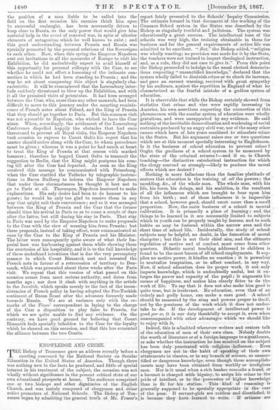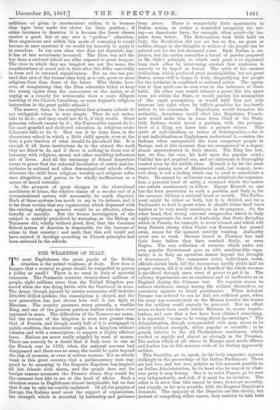KNOWLEDGE AND CRIME. T HE Bishop of Tennessee gave an address
recently before a meeting convened by the National Society on Secular Education in the United States of America. Though there was nothing new in the facts he produced, and little of special interest in his treatment of the subject, the occasion was not wholly without significance in the present critical state of our own educational prospects at home. The audience comprised one or two bishops and other dignitaries of the English Church, and was mainly composed of clergymen and other active promoters of National Schools. The Bishop of Ten- neesee began by admitting the general truth of Mr. Fraser's report lately presented to the Schools' Inquiry Commission. The estimate formed in that document of the working of the Common School system in the States was described ° by the Bishop as singularly truthful and judicious. The system was educationally a great success. The intellectual tone of the schools was very high, the training obtainable in them for business and for the general requirements of active life was admitted to be excellent. "Bat," the Bishop added, "religion was wholly wanting; no provision was made for it by the State, the teachers were not trained to impart theological instruction, and, as a rule, they did not care to give it." From this point the Bishop proceeded to indulge in the usual clerical denuncia- tions respecting " unsanctified knowledge," declared that the system wholly failed to diminish crime or to check its increase, and gave an earnest warning, received with great sympathy by his audience, against the repetition in England of what he characterized as the fearful mistake of a godless system of education.
It is observable that while the Bishop certainly showed from statistics that crime and vice were rapidly increasing in America, his own assertions respecting the connection of this phenomenon with the secular system of education were wholly gratuitous, and were unsupported by any evidence. He said nothing of the inevitable demoralization and weakening of social restraints produced by an angry civil war, nor of the many other causes which have of late years combined to stimulate crime in the States. But his argument raises one or two questions which are at this moment specially interesting to Englishmen. Is it the business of school education to prevent crime-? Ought the goodness of a school system to be measured by the state of the criminal returns I—and if so, is Church teaching—the distinctive catechetical instruction for which the clergy contend so strongly—likely to produce the moral effects which are desired-?
Nothing is more fallacious than the familiar platitude of orators that education is the training of all the powers ; the moulding, &e., of the whole man. The whole man, with his life, his force, his doings, and his ambition, is the resultant of all the influences which are brought to bear upon him from his birth ; and of these influences it is impossible that a school, however good, should exert more than a small proportion. Now, the main business of a school is mental cultivation. It is primarily a place of learning ; and the things to be learned in it are necessarily limited to subjects which in youth can be properly taught by lessons, and to such habits as may be fostered within the narrow area and the short time of school life. Incidentally, the study of school subjects may be helpful, no doubt, in the formation of moral character ; but this is not their chief aim, and the ultimate regulation of motive and of conduct must come from other quarters. Didactic moral teaching addressed. to children is found to be the most barren of all school employments. It sup- plies no motive power, it kindles no emotion ; it is powerless to neutralize temptation, or to affect conduct, in any way. Now, if school education does its proper work, it not only imparts knowledge, which is undoubtedly useful, but it en- larges the power and capacity of the pupil ; it augments his means of happiness, and makes him clearly fitter to do the work of life. To say that it does not also make him good-is quite true, but is irrelevant. No education, even that of an orderly and godly home, can make a man good. A school should be measured by the aims and powers proper to itself, not by the greatness of the work which it does not under- take to do. If the development of intellectual power is good per se, it is our duty thankfully to accept it, even when unaccompanied with other advantages which we should like to enjoy with it. Indeed, this is admitted whenever writers and orators talk of the education of men of their own class. Nobody doubts the worth of literature or of a foreign language to a gentleman, or asks whether the instruction he has received on the subject has been duly penetrated with religious influence. Even clergymen are not in the habit of speaking of their own attainments in classics, or in any branch of science, as unsanc- tified or dangerous knowledge, even though these accomplish- ments may have been obtained from worldly or irreligious men. Nor is it usual when a rich banker commits a fraud, or a baronet is charged with bigamy, to assign his crime to the pride of intellect, or to the possession of higher knowledge than is fit for his station. This kind of reasoning is generally supposed to be specially appropriate in -the case of the poor. If servant-girls are restless and dissatisfied, it is because they have learned to write. If artisans are seditious, or given to inconvenient strikes, it is because they have been made too clever for their position ; if crime increases in America, it is because the lower classes receive a good, but at any rate a " godless " education. How ungenerous and selfish this mode of reasoning is would become at once apparent if we would try honestly to apply it to ourselves. In our own class vice does not diminish, nay, it has of late notoriously increased. The Eton boy and the boy from a national school are alike exposed to great dangers. The vices to which they are tempted are not the same, the manifestations of moral evil in their after life differ materially z in form and in outward repulsiveness. But no one can pre- tend that men of the former class lead, as a rule, purer or more religious lives than those of the latter. Who thinks, how- ever, of complaining that the Eton education failed to keep the young squire from the race-course or the casino, or of urging as a remedy for aristocratic vices a more diligent teaching of the Church Catechism, or more dogmatic religious instruction in the great public schools ?
The answer, then, to the complaint that primary schools do not extinguish crime is very simple. They do not under- take to do it ; and they could not do it, if they would. Great grammar schools cannot do it ; the Universities cannot do it; the most guarded and sheltered education in religious estab- lishments fails to do it. How can it be done, then, in the elementary school in which a little child spends, even at the best, a poor fraction of what should be his school life. It is enough if all these institutions do to the utmost the work they are fitted to do, and if there is nothing in them out of harmony with religious, moral, and other ennobling influences out of doors. And all the testimony of School Inspectors seems to prove that the enforced inculcation of creeds and for- mularies in national and other denominational schools often alienates the child from religious worship and religions influ- ence altogether, and proves to be wholly inefficacious as a means of moral restraint.
- In the prospect of great changes in the educational machinery at home, the relative claims of a secular and of a denominational system will necessarily be much disputed. Each of these systems has much to say in its defence, and it is far from certain that any organization which dispensed with the existing religious agencies would be so effective, educa- tionally or morally. But the future investigation of the su.bject is unfairly prejudiced by assuming, as the Bishop of Tennessee did, wholly without proof, first, that the Common School system of America is responsible for the increase of crime in that country ; and next, that this evil would not have existed if theology according to Church principles had been enforced in the schools.































 Previous page
Previous page